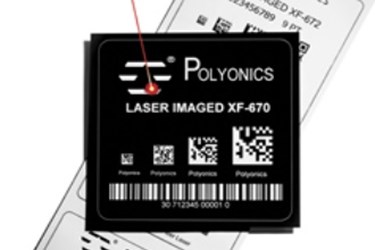Polyonics Introduces Laser Markable Label Materials For Harsh Aerospace Applications

Polyonics has recently introduced a family of black and white laser markable polyimide label materials that, through a series of rigorous chemical, abrasion, weather and temperature tests, have proven to be effective alternates for identifying and tracking critical aerospace components where direct laser marking is prohibited due to structural integrity concerns.
Westmoreland, NH (PRWEB) - Polyonics new laser markable label materials have recently been evaluated per the Boeing 13-47J standard for use in aerospace applications. The materials were rigorously testing for their resistance to the major chemicals present in the aerospace industry including Skydrol, jet fuel, salt water, methyl propyl keytone, etc . The testing also included severe abrasion and weatherability. The results showed that the Polyonics polyimide laser markable label materials represent a viable alternate to direct part marking while also performing better than acrylic and polyester (PET) laser markable label materials.
Safer and Lower Cost Alternative to Direct Part Marking Polyonics laser markable label materials represent the next generation ID and tracking technology for harsh environment aerospace applications. The polyimide label materials provide a high temperature, chemical resistant and safe means of labeling critical aerospace components especially when direct laser marking is prohibited due to structural integrity concerns. In addition, they allow rework and/or re-positioning options, not feasible with direct part marking, to help reduce overall manufacturing costs through reductions in scrap and rework.
High Temperature, More Flexible Alternate to PET and Acrylic Laser Markable Labels
Polyonics polyimide based materials provide both higher short and long term temperature resistances compared polyester (PET) and acrylic products. This feature produces a higher degree of dimensional stability and longer term image durability in harsh applications. In addition, polyimide materials don't exhibit the same brittleness associated with acrylic materials. This added flexibility allows them to be used in high impact and severe abrasion applications.
Superior to Thermal Transfer Printed Labels
The weak link in traditional thermal transfer printed labels is typically ink. This is particularly true in aerospace applications due to the high temperatures, harsh chemicals and high levels of abrasion. Along with passing the Boeing chemical tests, the materials havealso passed stringent Taber abrasion, UV and temperature cycling to offer an overall more durable alternate to traditional thermal printer labels.
LML Features and Benefits
- Flexible, higher temperature alternates to PET and acrylic materials for harsh environments
- No over-laminates required due to enhanced abrasion resistance
- Increased long term durability compared to printed labels
- Easily ablated by low power CO2, fiber, YAG and UV lasers
- Produces high resolution 2D and linear bar code images
- Black (XF-537 and XF-670) and TrueWhite™ (XF-539 and XF-672) options
- Available with high temperature acrylic, ultra-high temperature silicone and low surface energy pressure sensitive adhesives
- Low release liners for die cutting and auto apply application
- Tested to the Boeing 13-47J label performance standard
- Allows for rework and/or re-positioning of laser marked images
- XF-670 offers antistatic (10^4 to 10^9 Ohms) feature and low peel voltage (<100v)
- Halogen free, REACH and RoHS compliant
Polyonics at a Glance
Polyonics manufactures high performance materials for harsh environments. These include thermal transfer printed and laser markable label materials, single and double coated engineered tapes and flexible substrates with highly reflective and printable top coats. Polyonics materials are used by OEMS and specialty die-cut converters worldwide. The ultra-thin polyimide, polyester and aluminum materials are designed expressly for high temperatures and harsh environments plus provide flame retardant and static dissipative performances for electronics, automobile, aerospace and medical components.
For more information or to receive LML samples for evaluation, please contact Dave Genest at 603.903.6327 or dave.genest(at)polyonics(dot)com.
Source: PRWeb
View original release here: http://www.prweb.com/releases/2014/11/prweb12332386.htm
